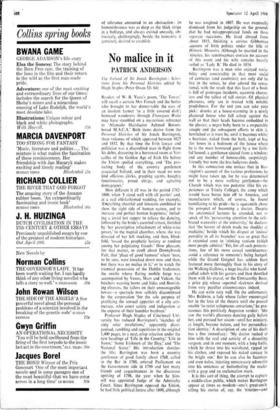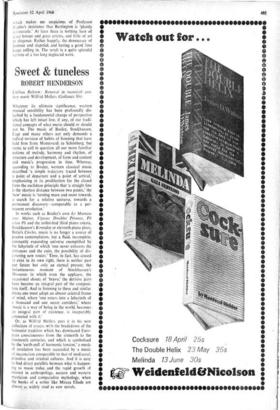No malice in it
PATRICK ANDERSON
Readers of W. B. Yeats's poem, 'The Tower,' will recall a certain Mrs French and the butler who brought to her dinner-table the ears of an insolent farmer 'in a little covered dish'; bemused wanderers through Finnegans Wake may have stumbled on a mysterious reference to 'Afamado Hairductor Achmed Borum- borad M.A.C.A.' Both items derive from the Personal Sketches of Sir Jonah Barrington, three volumes of which appeared between 1827 and 1832. By that time the Irish lawyer and politician was a discredited man in flight from his debts, dreaming in a borrowed room at Ver- sailles of the Golden Age of Irish life before the Union spoiled everything, and 'The pro- tecting body of the country gentlemen evacuated Ireland, and in their stead we now find officious clerks, grasping agents, haughty functionaries, proud clergy, and agitating demagogues.'
How different it all was in the period 1782- 1800, when 'I stood well with all parties' and, at a real old-fashioned wedding, for example, 'Everything cheerful and innocent combined to show the right side of human nature, and to increase and perfect human happiness,' includ- ing a jovial hot supper to relieve the dancing, followed by the bride's escorted retreat, fortified by 'her prescriptive refreshment of white-wine posset,' to the nuptial chamber, where she was divested of her left stocking, and then, blind- fold, 'tossed the prophetic hosiery at random among her palpitating friends.' How pleasant, for that matter, to stroll about Donnybrook Fair, that 'place of good humour' where 'men, to be sure, were knocked down now and then, but there was no malice in it,' or to watch the triennial procession of the Dublin tradesmen, the smiths whose flaring mobile forge was accompanied by Venus, Mars and Vulcan, the butchers wearing horns and hides and flourish- ing cleavers, the tailors on their unmanageable horses—a spectacle now selfishly discontinued by the corporation 'for the sole purpose of gratifying the sensual appetites of a city aris- tocracy, who court satiety and indigestion at the expense of their humbler brethren.'
Professor Hugh Staples of Cincinnati Uni- versity has reduced Barrington's 'sketches of sixty solar revolutions,' apparently disor- ganised, rambling and repetitious in the original 1,400 pages, to a neat, crisp selection under the new headings of 'Life in the Country,' Life in Town,' Some Irishmen of the Day,' and 'The National Scene.' His introduction sketches the life; Barrington was born a country gentleman of good family about 1760, called to the Bar in 1788, entered Parliament on the Government side in 1790 and lost many friends and acquaintances in the disastrous uprising of 1798, the year when he him- self was appointed Judge of the Admiralty Court. Since Barrington opposed the Union, he had little political future after 1800, although he was knighted in 1807. He was eventually dismissed from his judgeship on the grounds that he had misappropriated funds on three separate occasions. He lived abroad from about 1815, finishing a serious Gibbonian account of Irish politics under the title of Historic Memoirs. Although he married in the 'nineties, his reminiscences contain no account of this event and his wife remains heavily veiled as 'Lady B.' He died in 1834.
Barrington was a man who enjoyed socia- bility and conviviality in that most social of centuries (and countries); not only did he live in the senses, he also adored the sensa- tional, with the result that this feast of a book is full of grotesque incidents, eccentric charac- ters and the tallest of tall stories. Of physical pleasures, only sex is treated with notable prudishness. For the rest you can take your pick : drunks at a house-warming in a newly plastered house who fall asleep against the wall so that their heads become embedded in the plaster; a negro baby born to a respectable 'couple and the subsequent efforts to skin it, bewitched as it must be, until it becomes white; a barrister, naked from the bath, kept at bay for hours in a bedroom of the house where he is the most honoured guest by a too faith- ful hound; a gentleman ejected from a window; and any number of honourable, surprisingly friendly but none the less ludicrous duels.
In this connection one notices that in Bar- rington's account of the various professions he might have taken up, for he was determined not to be a mere walking gentleman—the Church which was too pedantic (like his ex- periences at Trinity College), the army which ;would have borne him off to America, and manufacture which, of course, he found humiliating to his pride—he is squeamish about the prospect of becoming a doctor. Despite the anatomical lectures he attended, not to speak of his 'persevering attention to the cele- brated waxworks at the university,' he declare, that 'the horror of death made me shudder at medicine,' beside which his disgust at 'animal putridity in all its branches' was so great that it extended even to 'stinking venison (which most people admire).' Yet, for all such protesta- tions, few of his more casual reminiscences avoid a reference to someone's being hanged, while the Grand Guignol has seldom been featured more thoroughly than in his story of the Walking Gallows, a huge loyalist who hand- cuffed rebels with his garters and then throttled them with his cravat, or the Enniscorthy Boar, a prize pig whose supernal sleekness derived from very peculiar circumstances indeed.
He can write very well. On the unfortunate Mrs Baldwin, a lady whose father encouraged her in the love of the theatre until she proved unable `to resist voluptuous sensations,' he pro- nounces this positively Augustan verdict: 'She saw the world's pleasures dancing gaily before her, and pursued her vision—until her mimicry, at length, became nature, and her personifica- tion identity.' A description of one of his duels has a fine immediacy: 'My doctor rushed at him with the zeal and activity of a dissecting surgeon, and in one moment, with a long knife, which he thrust into his waistband, ripped up his clothes, and exposed his naked carcase to the bright sun.' But he can also be facetious and even naive, injecting unnecessary adrenalin into his sentences or buttonholing the reader with a gasp and an exclamation mark.
It is this sort of thing, the attempt to capture a middle-class public, which makes Barrington appear at times so modern—one's great-uncle telling his stories of, say, the 'nineties—and v wc.11 makes me suspicious -of -Professor Staples's insistence that Barrington is 'plainly aristocratic.' At least there is nothing here of great houses and great estates, and little of art or elegance. Rather happily, the democracy of humour and slapstick and having a good time keeps rolling in. The result is a quite splendid Nersion of a too long neglected work.











































 Previous page
Previous page